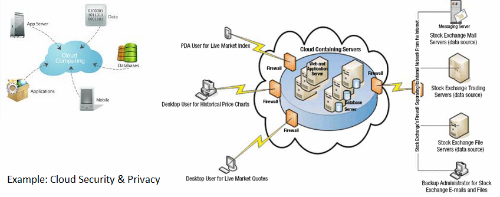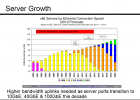The cloud model has been criticised by privacy advocates for the greater ease in which the companies hosting the cloud services control, thus, can monitor at will, lawfully or unlawfully, the communication and data stored between the user and the host company. Instances such as the secret NSA program, working with AT&T, and Verizon, which recorded over 10 million phone calls between American citizens, causes uncertainty among privacy advocates, and the greater powers it gives to telecommunication companies to monitor user activity. Using a cloud service provider (CSP) can complicate privacy of data because of the extent to which virtualization for cloud processing (virtual machines) and cloud storage are used to implement cloud service. The point is that CSP operations, customer or tenant data may not remain on the same system, or in the same data center or even within the same provider's cloud. This can lead to legal concerns over jurisdiction. While there have been efforts (such as US-EU Safe Harbor) to "harmonise" the legal environment, providers such as Amazon still cater to major markets (typically the United States and the European Union) by deploying local infrastructure and allowing customers to select "availability zones." Cloud computing poses privacy concerns because the service provider may access the data that is on the cloud at any point in time. They could accidentally or deliberately alter or even delete information.
Postage and delivery services company, Pitney Bowes launched Volly, a cloud-based, digital mailbox service to leverage its communication management assets. They also faced the technical challenge of providing strong data security and privacy. However, they were able to address the same concern by applying customized, application-level security, including encryption.
Compliance
In order to obtain compliance with regulations including FISMA, HIPAA, and SOX in the United States, the Data Protection Directive in the EU and the credit card industry's PCI DSS, users may have to adopt community or hybrid deployment modes that are typically more expensive and may offer restricted benefits. This is how Google is able to "manage and meet additional government policy requirements beyond FISMA and Rackspace Cloud or QubeSpace are able to claim PCI compliance.
Many providers also obtain a SAS 70 Type II audit, but this has been criticised on the grounds that the hand-picked set of goals and standards determined by the auditor and the auditee are often not disclosed and can vary widely. Providers typically make this information available on request, under non-disclosure agreement.
Customers in the EU contracting with cloud providers outside the EU/EEA have to adhere to the EU regulations on export of personal data.
U.S. Federal Agencies have been directed by the Office of Management and Budget to use a process called FedRAMP (Federal Risk and Authorization Management Program) to assess and authorize cloud products and services. Federal CIO Steven VanRoekel issued a memorandum to federal agency Chief Information Officers on December 8, 2011 defining how federal agencies should use FedRAMP. FedRAMP consists of a subset of NIST Special Publication 800-53 security controls specifically selected to provide protection in cloud environments. A subset has been defined for the FIPS 199 low categorization and the FIPS 199 moderate categorization. The FedRAMP program has also established a Joint Accreditation Board (JAB) consisting of Chief Information Officers from DoD, DHS and GSA. The JAB is responsible for establishing accreditation standards for 3rd party organizations who will perform the assessments of cloud solutions. The JAB will also review authorization packages and may grant provisional authorization (to operate). The federal agency consuming the service will still have the final responsibility for final authority to operate.
Legal
As with other changes in the landscape of computing, certain legal issues arise with cloud computing, including trademark infringement, security concerns and sharing of propriety data resources.
The Electronic Frontier Foundation has criticized the United States government for considering during the Megaupload seizure process that people lose property rights by storing data on a cloud computing service.
Open source
Open-source software has provided the foundation for many cloud computing implementations, prominent examples being the Hadoop framework and VMware's Cloud Foundry. In November 2007, the Free Software Foundation released the Affero General Public License, a version of GPLv3 intended to close a perceived legal loophole associated with free software designed to be run over a network.
Open standards
Most cloud providers expose APIs that are typically well-documented (often under a Creative Commons license) but also unique to their implementation and thus not interoperable. Some vendors have adopted others' APIs and there are a number of open standards under development, with a view to delivering interoperability and portability. As of November 2012, the Open Standard with broadest industry support is probably OpenStack, founded in 2010 by NASA and Rackspace, and now governed by the OpenStack Foundation. OpenStack supporters include AMD, Intel, Canonical, SUSE Linux, Red Hat, Cisco, Dell, HP, IBM, Yahoo and now VMware.
Security
As cloud computing is achieving increased popularity, concerns are being voiced about the security issues introduced through adoption of this new model. The effectiveness and efficiency of traditional protection mechanisms are being reconsidered as the characteristics of this innovative deployment model can differ widely from those of traditional architectures. An alternative perspective on the topic of cloud security is that this is but another, although quite broad, case of "applied security" and that similar security principles that apply in shared multi-user mainframe security models apply with cloud security.
The relative security of cloud computing services is a contentious issue that may be delaying its adoption. Physical control of the Private Cloud equipment is more secure than having the equipment off site and under someone else’s control. Physical control and the ability to visually inspect the data links and access ports is required in order to ensure data links are not compromised. Issues barring the adoption of cloud computing are due in large part to the private and public sectors' unease surrounding the external management of security-based services. It is the very nature of cloud computing-based services, private or public, that promote external management of provided services. This delivers great incentive to cloud computing service providers to prioritize building and maintaining strong management of secure services.[88] Security issues have been categorised into sensitive data access, data segregation, privacy, bug exploitation, recovery, accountability, malicious insiders, management console security, account control, and multi-tenancy issues. Solutions to various cloud security issues vary, from cryptography, particularly public key infrastructure (PKI), to use of multiple cloud providers, standardisation of APIs, and improving virtual machine support and legal support.
Cloud computing offers many benefits, but it also is vulnerable to threats. As the uses of cloud computing increase, it is highly likely that more criminals will try to find new ways to exploit vulnerabilities in the system. There are many underlying challenges and risks in cloud computing that increase the threat of data being compromised. To help mitigate the threat, cloud computing stakeholders should invest heavily in risk assessment to ensure that the system encrypts to protect data; establishes trusted foundation to secure the platform and infrastructure; and builds higher assurance into auditing to strengthen compliance. Security concerns must be addressed in order to establish trust in cloud computing technology.
Sustainability
Although cloud computing is often assumed to be a form of "green computing", there is no published study to substantiate this assumption, citing the servers affects the environmental effects of cloud computing. In areas where climate favors natural cooling and renewable electricity is readily available, the environmental effects will be more moderate. (The same holds true for "traditional" data centers.) Thus countries with favorable conditions, such as Finland, Sweden and Switzerland, are trying to attract cloud computing data centers. Energy efficiency in cloud computing can result from energy-aware scheduling and server consolidation. However, in the case of distributed clouds over data centers with different source of energies including renewable source of energies, a small compromise on energy consumption reduction could result in high carbon footprint reduction.
Abuse
As with privately purchased hardware, customers can purchase the services of cloud computing for nefarious purposes. This includes password cracking and launching attacks using the purchased services. In 2009, a banking trojan illegally used the popular Amazon service as a command and control channel that issued software updates and malicious instructions to PCs that were infected by the malware.
IT governance
The introduction of cloud computing requires an appropriate IT governance model to ensure a secured computing environment and to comply with all relevant organizational information technology policies. As such, organizations need a set of capabilities that are essential when effectively implementing and managing cloud services, including demand management, relationship management, data security management, application lifecycle management, risk and compliance management.







